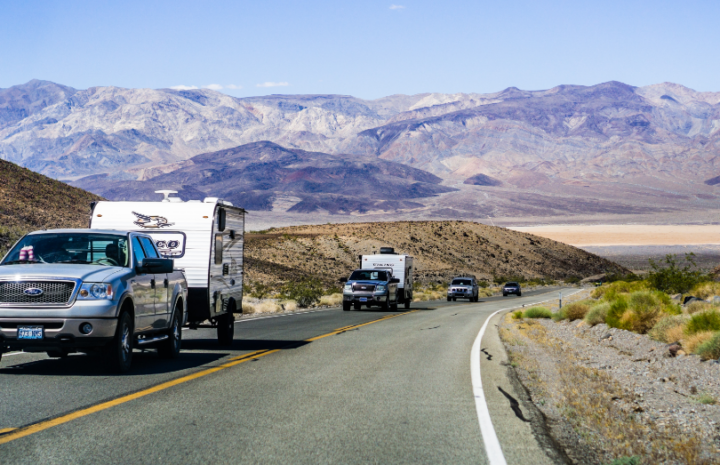What is the best choice when you want a vehicle for towing? Towing means you’ve got the equipment and power to pull a trailer, but what should you consider?
When you’ve got a vehicle with enough power to pull a trailer full of equipment or a boat, you get to increase the fun and the cargo capacity of your vehicle. Going camping is a lit more fun when you have a trailer to carry your outdoor kitchen stuff, canopies, and camp furniture, which might not fit into your truck or SUV.
Here are some key features and considerations when searching for the right tow vehicle.
Towing Capacity: The Number One Factor
The weight that a vehicle can safely pull behind it is called its tow capacity. This measurement tells you how many pounds you can add to your vehicle when you want to take a trailer full of gear or a boat to your fun outdoor destination.
Towing capacity is split into three classes, much like the vehicles that handle the job. These towing capacities are:
- Light-Duty – Up to 2,000 pounds: This level is good for small fishing boats, jet skis, and small utility trailers. Most light-duty towing models are compact SUVs and some larger sedans.
- Medium-Duty – 2,000-5,000 pounds: If you need more than a light-duty vehicle can handle but still have less than 5,000 pounds to pull, these vehicles are right for the job. Some larger boats, personal watercraft, and pop-up campers fit into this category.
- Heavy-Duty – 5,000 pounds and above: Nearly every pickup truck on the market will fit into this class. Tow ratings go up to as much as 40,000 pounds, which means this is the largest class of towing-capable vehicles for you to choose from.
Note: It’s a good idea to leave 10-20% of the maximum towing capacity unused. This helps you handle unforeseen added weight and changing weather conditions.
The Right Vehicle: Trucks or SUVs
Every once in a while, you’ll see a small car pulling a trailer, but this doesn’t happen often. Most of the time, the best and most useful vehicles for towing are trucks and SUVs. Each vehicle type has its pros and cons, which are:
Pickup Trucks
Pros
- Highest towing capacity in the market, especially heavy-duty trucks
- Excellent payload capacity
- Rugged and tough to handle off-road situations
Cons
- Lower fuel efficiency compared to SUVs
- Less comfortable for everyday driving
- Large size can be tough to maneuver in parking lots
SUVs
Pros
- More comfortable ride than trucks
- Better fuel economy than trucks
- Typically more passenger space and covered cargo area
Cons
- Lower towing capacity than trucks
- Less payload capacity than pickups
- Many SUVs struggle with heavy trailers
Towing Experience: Make it Better
When you want the right vehicle for towing, it needs to have some essential features to handle the extra weight of a trailer that isn’t normally attached to the vehicle. Some of these items help make it much easier to handle the trailer, including:
- Engine Power – When you need to pull heavy loads, especially when going uphill or against the wind, you need ample engine power to handle the job. You don’t want your engine hitting the redline just to pull the trailer to your destination; this can seriously damage your vehicle.
- Transmission – A powerful transmission that’s made for towing makes pulling heavy trailers much better. The smooth-shifting up and down through the gears can give you more confidence when you’ve got a trailer attached to your vehicle.
- Brakes – Bigger, better, and heavier-duty brakes are essential for safe stopping when you have a heavy trailer attached to your vehicle. The best vehicle for towing should have disc brakes on all four wheels to give you the best braking power.
- Suspension – A heavy-duty suspension helps keep the trailer in line with your vehicle while towing. This system keeps things stable and allows you to tow without too much worry while on your way to the destination.
- Hitch – The right hitch for your trailer’s weight is important to ensure your trailer doesn’t break the hitch and get loose from your vehicle. A weight-distributing hitch is a good idea to distribute the weight more evenly across the vehicle and trailer axles.
These are some things to consider when you want to buy a vehicle for towing your trailer to your favorite destinations. Once you’ve got the right vehicle, where will you take your trailer, and what will you do when you get there?
This post may contain affiliate links. Meaning a commission is given should you decide to make a purchase through these links, at no cost to you. All products shown are researched and tested to give an accurate review for you.

